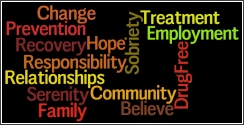 Addiction is an uphill battle. We have heard this said many times before. Many who found themselves in the midst of a personal opioid addiction were swept along on a nightmarish roller coaster ride with seemingly no brake pedal within reach.
Addiction is an uphill battle. We have heard this said many times before. Many who found themselves in the midst of a personal opioid addiction were swept along on a nightmarish roller coaster ride with seemingly no brake pedal within reach.
Fortunately, addiction recovery is real, and people do get off of the roller coaster ride to hell. This is accomplished in a variety of ways with one method sometimes being the decision to try opioid replacement therapy such as methadone or suboxone.
Once off the roller coaster, individuals have an opportunity to survey their surroundings, to reflect on what has happened in their lives, and to begin moving along a better, safer path. Inevitably, facing the consequences of one's past becomes part of this gradual recovery process as does repairing the damage that occurred.
It is important to remember that change does not happen overnight, and repairing one's life happens step-by-step a little each day. There is a popular saying in recovery circles that is profound in its wisdom. It's "progress, not perfection". What this means is that no one is perfect, and that chasing perfection is perhaps an unrealistic goal. The goal should be "progress". This … is achievable. In repairing one's life and in living a new life of recovery, pursuing "progress" is enough.
Another insightful saying is this … "A journey of a 1000 miles begins with the first step". Once you have committed to sobriety and living your life in a better way, you have already taken several steps in the right direction on your new journey. You do not have to reach your destination in 24 hours. The journey itself is a huge part of your personal healing & personal growth.
Repairing one's life after opioid addiction will require several things of you. One is to cultivate patience with the world. The world often moves at a different speed than we do, and it is in our best interest to adjust to that rather than to try and control the speed of the world around us. This will require patience. Patience can grow. We can develop patience through mindfulness, prayer, therapy, and in other ways.
Also important to repairing one's life is trying to live with a sense of purpose. We must be committed to something, or someone, in order to live with a sense of purpose. In active addiction, the daily purpose was to get by without becoming sick, and that defined many addicts' focus day after day. Life loses its purpose when one is reduced to chasing drugs to avoid being dope sick.
Recovery offers so much more in terms having a new and improved life purpose. I can't tell you what that should be. But for some, it's being a good son or daughter, or a good spouse or parent. Or regaining a renewed sense of pride in their job, or "giving it away" and helping another addict or person in need, or volunteering to help a child learn to read, or mowing the yard of an elderly neighbor who can't do for themselves as well anymore.
Your purpose may not be known yet. But you can certainly discover what is really important to you once you get off the roller coaster ride of opioid addiction. As always, recovery is a choice. No one can force it on you. But it is there, available to you … when you are ready. Call your local clinic today. Ask a friend to help you find local resources. Choose to take your first step.
 Dr. Jana Burson made a recent post about the newly FDA-approved medication for treating opioid dependence called Zubsolv. Zubsolv is manufactured by a Swedish pharmaceutical company, Orexo.
Dr. Jana Burson made a recent post about the newly FDA-approved medication for treating opioid dependence called Zubsolv. Zubsolv is manufactured by a Swedish pharmaceutical company, Orexo.
 Follow
Follow

 Addiction is an uphill battle. We have heard this said many times before. Many who found themselves in the midst of a personal opioid addiction were swept along on a nightmarish roller coaster ride with seemingly no brake pedal within reach.
Addiction is an uphill battle. We have heard this said many times before. Many who found themselves in the midst of a personal opioid addiction were swept along on a nightmarish roller coaster ride with seemingly no brake pedal within reach. A new methadone clinic in North Haven, Connecticut recently opened called APT. Lynn Madden, who is the acting CEO of APT Foundation, has made a concerted effort to connect with the local community in order to help citizens understand that methadone clinics can be operated safely and discreetly with no adverse effects to the surrounding neighborhood.
A new methadone clinic in North Haven, Connecticut recently opened called APT. Lynn Madden, who is the acting CEO of APT Foundation, has made a concerted effort to connect with the local community in order to help citizens understand that methadone clinics can be operated safely and discreetly with no adverse effects to the surrounding neighborhood. Recovery is for everyone and anyone with a genuine desire for change. Treatment in a methadone program offers the potential for change, and a new path which can lead to a much improved life.
Recovery is for everyone and anyone with a genuine desire for change. Treatment in a methadone program offers the potential for change, and a new path which can lead to a much improved life.



